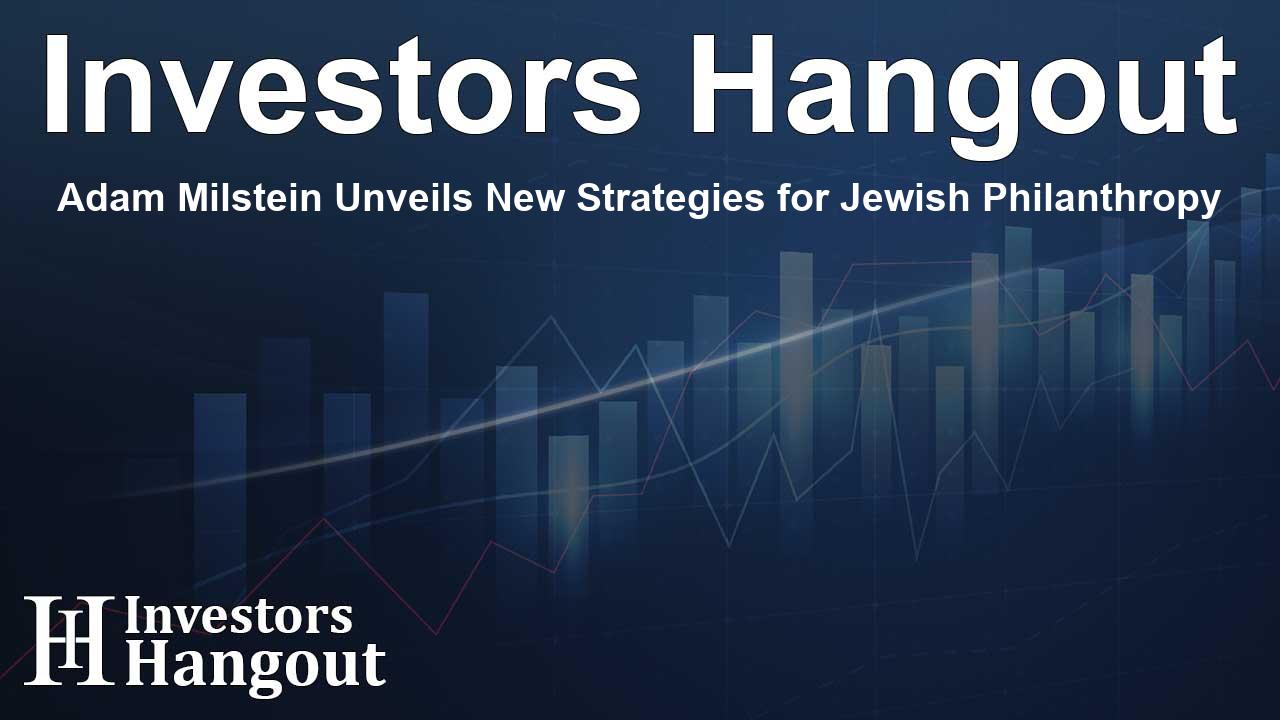Adam Milstein Unveils New Strategies for Jewish Philanthropy

Reimagining Jewish Philanthropy in Challenging Times
In an age where vulnerabilities seem to rise against Jewish communities, Adam Milstein, an influential Israeli-American philanthropist, has released a significant white paper entitled "The Strategic Imperative: Transforming Jewish Philanthropy for an Era of Global Challenges." This document serves as a crucial blueprint aimed at providing strategic frameworks and innovative solutions necessary for navigating the complexities faced by Jewish organizations worldwide.
Understanding Contemporary Threats
Within the white paper, Milstein presents a thorough examination of the evolving landscape of antisemitism which has intensified dramatically in recent times. Following notable incidents that have increased concerns regarding communal safety, there is an urgent need to address these threats head-on. Milstein's insights are both quantitative and qualitative, evaluating statistics but also drawing from personal accounts and community feedback to understand the severity of the situation.
Milstein's Vision for a Resilient Community
Milstein articulates a poignant reflection, stating, "The current moment is not merely another crisis point in Jewish history - it represents a fundamental shift in the nature of threats facing our community." This reflection encapsulates a significant shift in perspective regarding the sophistication of modern antisemitism, particularly highlighting emerging alliances that compound existing challenges. His work promotes understanding that conventional philanthropic methods may no longer address the root causes and present-day complexities.
Key Areas of Focus
The white paper delves into essential themes that require attention, including an in-depth analysis of antisemitism that has surged following recent geopolitical events. It critiques existing philanthropic and security responses, suggesting they lack the depth and adaptability to effectively address contemporary realities.
Strategic Framework Proposal
Among the strategies proposed, Milstein emphasizes building sustainable infrastructure for Jewish communities that reinforces resilience and security. He advocates for digital transformation, leadership development, and the creation of cross-cultural coalitions that can unify efforts across different sectors. Furthermore, he provides actionable recommendations aimed at creating both immediate responses and long-term visions that enable proactive community engagement.
Guiding Principles of Leadership
At the core of Milstein's approach lies a set of guiding principles that he deems vital for effective leadership. These principles entail mental acuity, physical strength, sustainable resource allocation, and an unwavering passion for the cause at hand. He emphasizes that when these components are harmonized, they pave the way for transformational change and a robust response to adversity.
Call to Action
Milstein highlights the pressing need for bold action among community leaders and philanthropic organizations, proclaiming, "Through strategic philanthropy, technological innovation, and committed leadership, we can transform current challenges into opportunities for growth and renewal." His call to adopt a proactive stance reflects a deep understanding of the complexities and urgency of the times.
Conclusion and Accessing Further Information
This crucial white paper is accessible for those interested in exploring Milstein's strategic vision further. It sheds light on how Jewish philanthropy can adapt to enhance resilience amidst adversity. Milstein's relentless commitment to fostering not just survival, but thriving in challenging circumstances, is evidence of the vision he has for the future.
Frequently Asked Questions
What motivated Adam Milstein to publish this white paper?
Milstein aims to provide a strategic framework to address the increasing challenges and threats faced by Jewish communities globally.
What key themes are addressed in his publication?
The paper covers themes like the analysis of contemporary antisemitism, critiques of existing responses, and proposals for building sustainable community infrastructure.
How does Milstein define modern antisemitism?
He describes it as a complex threat intertwined with various socio-political alliances that necessitate a reevaluation of traditional responses.
What are Milstein's guiding principles for effective philanthropy?
The principles include mental acuity, physical strength, sustainable resource allocation, and passionate dedication to the causes that matter to communities.
What is the overall goal of Milstein's strategic recommendations?
The goal is to transform challenges into opportunities for growth and renewal within Jewish communities through innovative strategies and leadership.
About The Author
Contact Hannah Lewis privately here. Or send an email with ATTN: Hannah Lewis as the subject to contact@investorshangout.com.
About Investors Hangout
Investors Hangout is a leading online stock forum for financial discussion and learning, offering a wide range of free tools and resources. It draws in traders of all levels, who exchange market knowledge, investigate trading tactics, and keep an eye on industry developments in real time. Featuring financial articles, stock message boards, quotes, charts, company profiles, and live news updates. Through cooperative learning and a wealth of informational resources, it helps users from novices creating their first portfolios to experts honing their techniques. Join Investors Hangout today: https://investorshangout.com/
The content of this article is based on factual, publicly available information and does not represent legal, financial, or investment advice. Investors Hangout does not offer financial advice, and the author is not a licensed financial advisor. Consult a qualified advisor before making any financial or investment decisions based on this article. This article should not be considered advice to purchase, sell, or hold any securities or other investments. If any of the material provided here is inaccurate, please contact us for corrections.
